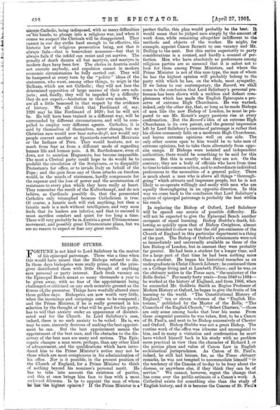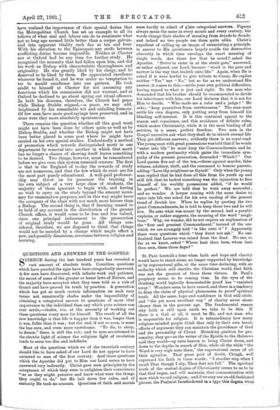BISHOP STU F ORTUNE is not kind to Lord Salisbury in
the matter of his episcopal patronage. There was a time when this would have meant that the Bishops refused to die. In those days bishoprics were really prizes, and the prize- giver distributed them with little thought of anything save personal or party interest. Each fresh vacancy on the Episcopal Bench meant so many thousands a year to be given away, with no fear of the appointment beine- challenged or criticised on any such eccentric ground as the fitness of.the presentee. Things have woefully altered since those golden days. Bishoprics are now worth very little, when the incomings and outgoings come to be compared ; and the Prime Minister, if he is really governed in his selection by the thought of what will be good for his party, has to veil that anxiety under an appearance of disinter- ested zeal for the Church. In Lord Salisbury's case, indeed, there is no such anxiety to be veiled. He is, we may be sure, sincerely desirous of making the best appoint- ment he can. But the best appointment means the appointment of the best man, and the obstacles to the dis- covery of the best man are many and serious. The Epis- copate changes a man more, perhaps, than any other kind of advancement, and the qualifications which have intro- duced him to the Prime Minister's notice may not be those which are most conspicuous in his administration of his office. Nor is it possible, in the present position 'of the Church of England, for a Prime Minister to think of nothing beyond his nominee's personal merit. He has' to take into account the existence of parties, and this at once brings him face to face with a most awkward dilemma. Is he to appoint the man of whom he 'hat ab highest opinion ? If the Prime Minister is a perfect Gallic), this plan would probably be the best. It would mean that he judged men simply by the amount of work done, while remaining altogether indifferent to the methods and objects of the worker. He might, for example, appoint Canon Barnett to one vacancy and • Mr. Dolling to the next. But this entire superiority to party considerations is a counsel, and hardly a counsel of per- fection. Men who have absolutely no preferences among religious parties are so unusual that it is safest not to look for them among Prime Ministers, and where the Prime Minister is not of this rare type, the man of whom he has the highest opinion will probably belong to the party with which he has, on the whole, most sympathy. If we listen to our contemporary, the Record, we Wall come to the conclusion that Lord Salisbury's personal pre- ference has been shown with a reckless and defiant com- pleteness which has made the English Episcopate a pre- serve of extreme High Churchmen. He was warned, indeed, only the other day, that, so- long as he made Bishops of men like the new Bishop of London, he must be pre- pared to see Mr. Kensit's angry passions rise at every confirmation. .But the .Record's'idea of an extreme High Churchman is its own patent, and the general impression left by Lord Salisbury's exercise of patronage is rather that his choice commonly falls on a moderate High Churchman, and leaves extreme opinions, well on one side. The only other course open to him would be to take men of extreme opinions, but to take them alternately from oppo- site camps. If Bishops were isolated and independent authorities, there would be something to be said for this course. But this is exactly what they are not. On the contrary, they are a body of officials who have from time to time to take common action, and to subordinate individual preferences to the necessities of a general policy. There is much about a man who is above all things " thorough- going " which attracts and impresses people, but he is not likely to co-operate willingly and easily with men who are equally thoroughgoing in an opposite direction. In this way we come back to the conclusion that Lord Salisbury's system of episcopal patronage is probably the best within his reach.
In replacing the Bishop of Oxford, Lord Salisbury will be spared one source of possible difficulty. He will not be expected to give the Episcopal Bench another occupant of equal learning. Bishop Stubbs's death, fol- lowing so quickly upon that of Bishop Creighton, almost seems intended to show us that the old pre-eminence of the Church of England in this particular department is a thing of the past. The Bishop of Oxford's attainments were not so immediately and universally available as those -of the late Bishop of London, but in amount they were probably far greater. He had been a student for a longer time, and for, a large part of that time he had -been nothing more than a student. He began his historical reseaches as an undergraduate in Christ Church Library; he continued them on a College living and at Lambeth Palace; and he was, as the obituary notice in the Times says, "the mainstay of the Rolls Series." For nearly forty years—from 1848 to 1884— he worked at the history of England, and from 1866, when he succeeded Mr. Goldwin Smith as Regius Professor of Modern History at Oxford, he began to give the fruits of his learning to the world. "The Constitutional History of England," ten or eleven volumes of the "English His- torians," published by the Master of the Rolls; "The Councils of the English Church," "Select Charters,"—these are only some among books that bear his name, From these congenial pursuits he was taken, first, to be a Canon of St. Paul's, and next to be Bishop successively of Chester and Oxford. Bishop Stubbs was not a great Bishop. The routine work of the office was irksome and uncongenial to him, and in many a visitation and confirmation he must have wished himself back in his study with no problem more practical in view than the character of Richard I. or the precise place and value of Canon Law in English ecclesiastical jurisprudence. As Canon of St. Paul's, indeed, he still had leisure, for, as the Times • obituary remarks, he was not tempted to accommodate himself " tO the tendency of the Canons of to-day to be busy about the diocese, or anywhere else, if they think they can be of service." We cannot, however, regret the change that. has come over the public estimate of a Canon's work.. A Cathedral exists for something else than the study of English history, and it is because the Canons of St. 'Paul's have realised the importance of their special duties that the Metropolitan Church has set an example to all its fellows of what zeal and labour can do to reanimate what not so long ago seemed little better than a corpse galvan- ised into apparent vitality each day at ten and four. With his elevation to the Episcopate any strife between conflicting duties became impossible. Neither at Chester nor at Oxford had he any time for further study. He recognised the necessity that had fallen upon him, and did his work as Bishop with characteristic thoroughness and originality. He was greatly liked by his clergy, and he deserved to be liked by them. He appreciated excellence wherever he found it, and he was under no temptation to try to mould excellence into one pattern. He took credit to himself at Chester for not assuming any functions which his commission did not warrant, and at Oxford he declined to go about spying out ritual offences. In both his dioceses, therefore, the Church had peace while Bishop Stubbs reigned,—a peace, we may add, brightened by his remarkable wit and unfailing humour. Of few men have more good sayings been preserved, and in none were they more absolutely spontaneous.
There remains the question whether all this good work might not have been done by others quite as well as by Bishop Stubbs, and whether the Bishop might not have been better placed in some post where he might have carried on his own special studies. Undoubtedly a method of promotion which rewards distinguished merit in one department by removal into another in which that merit has no longer a chance of showing itself leaves something to be desired. Two things, however, must be remembered. before we give even this system unmixed censure. The first is that in the England of to-day the rewards of study are not numerous, and that the few which do exist are for the most part purely educational. A well-paid professor- ship may throw on its possessor the training in his own subject of a very large class of students, the majority of them ignorant to begin with, and having no wish to carry on the study beyond the amount neces- sary for examination purposes, and in this way might leave the occupant of the chair with not much more leisure than a Bishop. The second thing is, that if learning ceased to be held of any account in the distribution of the greater Church offices, it would come to be less and less valued, since one principal inducement to the prosecution of original study would be gone. All things con- sidered, therefore, we are disposed to think that things would not be mended by a change which might effect a new, and possibly disastrous, severance between religion and learning.























































 Previous page
Previous page